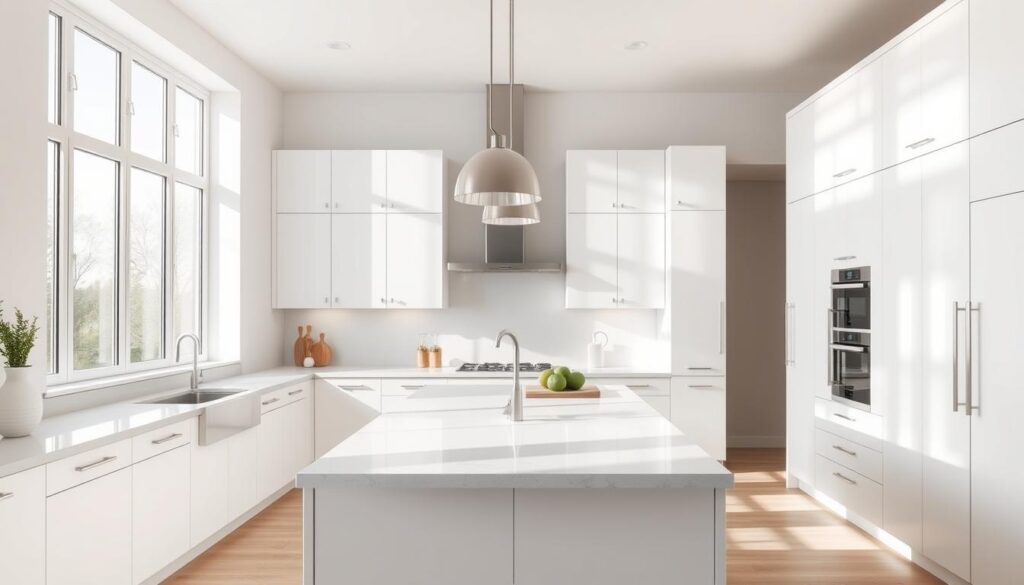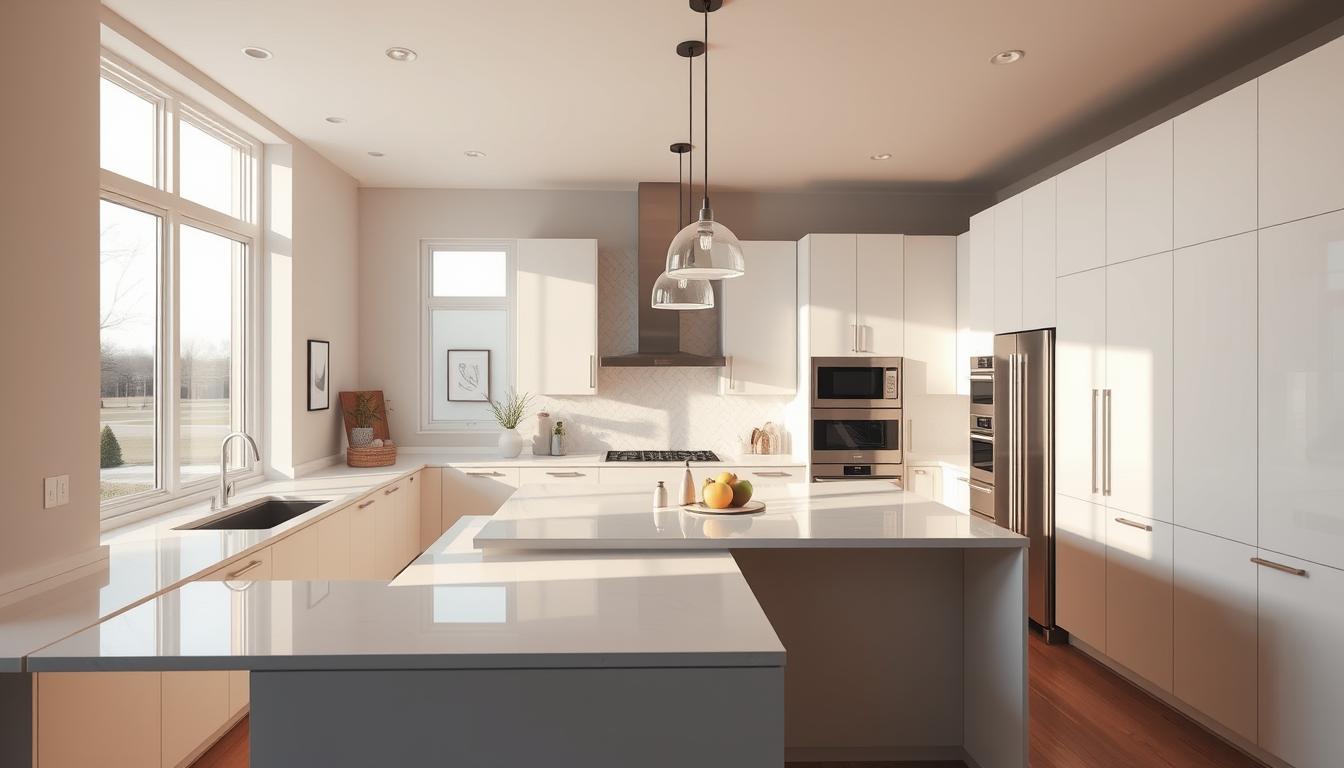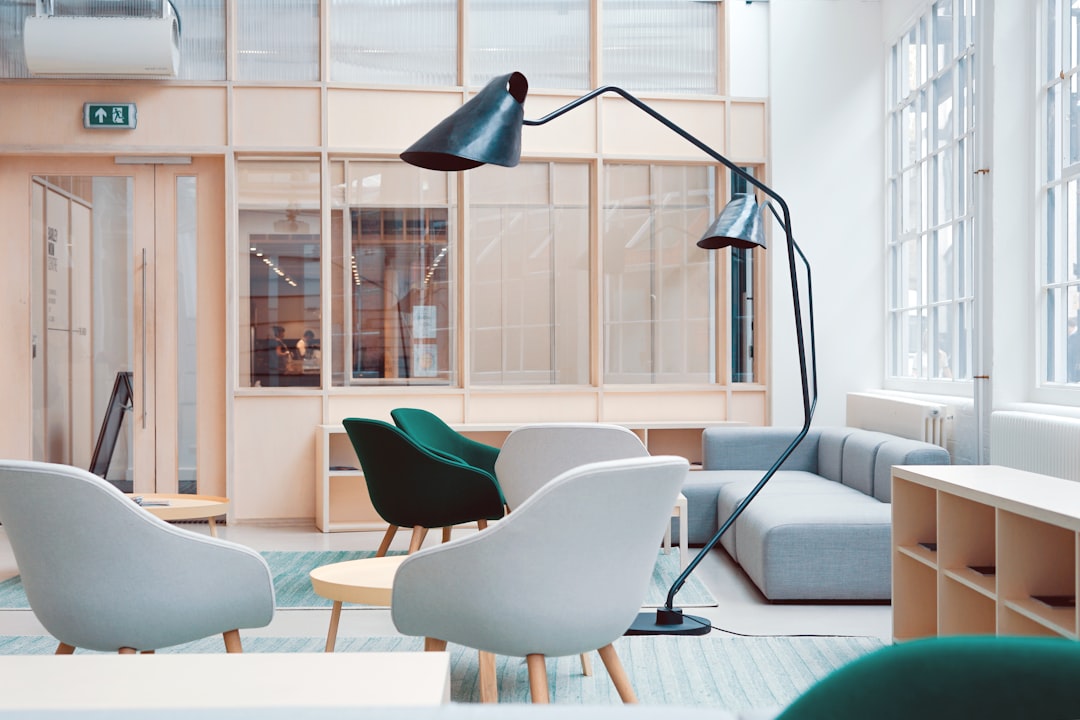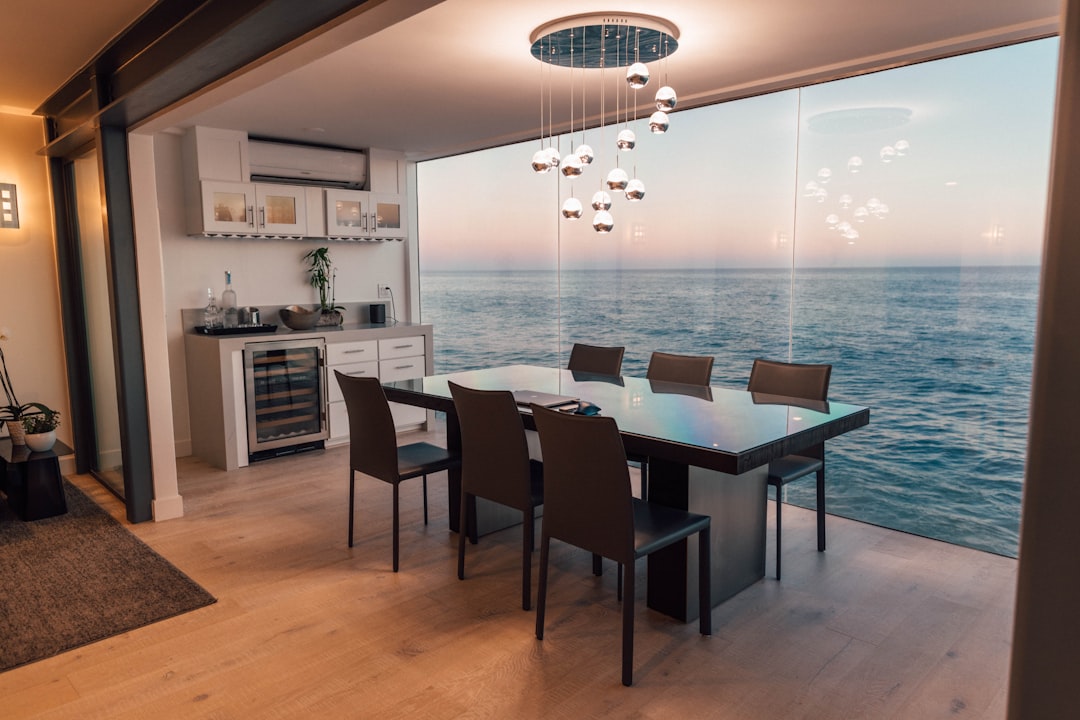A well-crafted kitchen is more than just a place to cook. It’s the heart of the home. With 70% of homeowners seeing their kitchen as key to their home’s look, it’s clear that kitchen design ideas are vital in home makeovers.
We’ll look at what makes a kitchen both beautiful and useful. This includes picking the right colors and materials for countertops and cabinets. Our aim is to share expert advice to help you create a modern kitchen interior that’s welcoming and efficient.
Key Takeaways
- Understand the importance of aesthetics and functionality in kitchen design.
- Learn how to select the right color scheme for your kitchen.
- Discover the best materials for countertops and cabinets.
- Get expert tips on creating a modern and inviting kitchen space.
- Explore how to balance personal style with practicality in kitchen design.
Understanding the Importance of Kitchen Interior Design
Kitchen interior design is key to our daily lives. It shapes how we cook, interact, and live. A well-designed kitchen is more than looks; it’s a space that improves our lifestyle.
How Kitchen Design Affects Daily Life
The design of our kitchen greatly impacts our daily routines. A well-thought-out kitchen layout can make cooking faster and more fun. The materials and finishes we choose also affect the kitchen’s durability and upkeep.
By picking the best kitchen designs, we can make our kitchen both stunning and practical.
The kitchen’s design also shapes our social life. A kitchen with plenty of seating and a welcoming vibe makes it perfect for gatherings. Exploring the complete guide to kitchen interior design can help us create such spaces.
The Role of the Kitchen as a Central Hub
The kitchen is often called the heart of the home. It’s where we eat, help with homework, and socialize. A well-designed kitchen makes this space more inviting and functional for everyone.
It’s important to keep up with kitchen remodeling trends to design a kitchen that meets our needs. Open-concept kitchens, for example, are popular for their ability to bring people together.
Trends Shaping Modern Kitchen Interiors
Modern kitchen interiors are influenced by several trends. Sustainability is a big one, with people choosing eco-friendly materials and energy-saving appliances. Technology is also playing a big role, with smart appliances and home automation systems becoming common.
Contemporary kitchen decor is moving towards minimalism and clean lines. This creates a modern and elegant look. By keeping up with these trends, we can design kitchens that are both beautiful and forward-thinking.
Key Elements of Kitchen Interior Design
Creating a beautiful and functional kitchen needs careful thought. We’ll look at key elements that affect your kitchen’s look and use.
Selecting the Right Color Scheme
The color scheme is key in kitchen design, setting the mood. Think about the style and feel you want. For a stylish kitchen renovation, bold colors can make a statement. A calm kitchen might use a single color.
Popular color schemes include:
- Monochromatic: Using different shades of one color for a unified look.
- Complementary: Choosing colors on opposite sides of the color wheel for contrast.
- Analogous: Selecting colors next to each other on the color wheel for harmony.
Choosing Materials for Countertops and Cabinets
The materials for countertops and cabinets affect your kitchen’s look and last. For a luxurious kitchen makeover, go for high-end options like granite or quartz. Custom cabinets add a personal touch.
| Material | Durability | Aesthetic Appeal |
|---|---|---|
| Granite | High | Natural, elegant |
| Quartz | High | Versatile, modern |
| Laminate | Medium | Budget-friendly, varied designs |
Lighting Considerations for Functionality and Aesthetics
Lighting is crucial in kitchen design, for both looks and function. Good lighting makes cooking safer and more efficient. Use a mix of ambient, task, and accent lighting for a top kitchen design tip.
- Under-cabinet lighting to light up countertops.
- Pendant lights over islands or peninsulas.
- Recessed lighting for overall light.
Popular Kitchen Layouts and Their Benefits
The right kitchen layout can make your cooking space a lively hub. It combines function and beauty. When designing your kitchen, the layout is key. It affects both how well you work and the look of the space.
We’ll look at three popular kitchen layouts: Open Concept, Galley, and L-Shaped and U-Shaped Designs. Each layout has its own benefits, like better efficiency or more social interaction.
Open Concept Kitchens
Open concept kitchens are loved for making spaces feel bigger and more social. They remove walls between the kitchen and living areas. This makes cooking more inclusive and fun.
For more kitchen design ideas, check out Cozy Nest Plans. They have lots of inspiration for modern kitchens.
Benefits of Open Concept Kitchens:
- Enhanced social interaction
- Increased sense of space
- Flexibility in design and layout
Galley Kitchens: Efficient and Space-Savvy
Galley kitchens are known for their efficient use of space. They have parallel countertops and cabinets. This design is great for narrow kitchens where space is limited.
Design experts say, “Galley kitchens are a smart choice for those who want efficiency in a small space.”
“A well-designed galley kitchen can be a game-changer for small kitchens. It offers plenty of storage and counter space while staying sleek and uncluttered.”
| Layout | Efficiency | Space Utilization |
|---|---|---|
| Galley | High | Optimized |
| Open Concept | Variable | Flexible |
| L-Shaped | High | Efficient |
L-Shaped and U-Shaped Designs
L-Shaped and U-Shaped kitchen designs are versatile and functional. The L-Shaped layout has two adjacent countertops, making workflow smoother. The U-Shaped design adds more counter space and storage.
Both L-Shaped and U-Shaped designs fit various kitchen sizes. They can be customized to include modern kitchen interiors and designs. This makes them popular for kitchen makeovers.
Integrating Technology into Kitchen Design
Technology is becoming a big part of our kitchens. It makes cooking and dining better. This change is making kitchens more functional and enjoyable.
Smart appliances are key in this tech integration. They make cooking easier and faster. For example, smart fridges can track groceries and suggest recipes.
Smart Appliances Enhancing Cooking
Smart appliances are changing cooking. They offer voice control, remote monitoring, and automated settings. This makes cooking more convenient and precise.
Some benefits of smart appliances include:
- Enhanced cooking precision
- Increased energy efficiency
- Improved safety features
- Remote monitoring and control
The Role of Home Automation
Home automation is important in modern kitchens. It integrates systems like lighting and temperature. This makes the kitchen experience better.
Home automation offers many benefits. For example, you can control lighting and temperature with your voice or a mobile app. This creates a cozy atmosphere.
Integrated Entertainment Solutions
Entertainment systems are making kitchens social hubs. They include waterproof speakers and smart TVs. For more on kitchen tech, visit this resource.
By adding these technologies, kitchens become more than just cooking spaces. They become places for socializing. The best designs now mix technology with style.
In conclusion, adding technology to kitchens improves both function and looks. Smart appliances, home automation, and entertainment systems make kitchens modern and convenient. They offer a blend of efficiency, style, and social interaction.
Maximizing Storage in Kitchen Interiors
Effective kitchen storage solutions can greatly improve the space’s functionality. When designing or renovating a kitchen, focus on maximizing storage. This helps keep the cooking area clutter-free and efficient.
Utilizing Vertical Space Effectively
Using vertical space is a smart way to increase kitchen storage. Tall cabinets that go up to the ceiling can add a lot of storage. Wall-mounted shelves or pot racks are great for keeping items within reach while keeping countertops clear.
For a stylish kitchen, think about adding open shelving. It’s perfect for displaying decorative items or cookbooks, adding a personal touch.
Innovative Cabinet Solutions
Innovative cabinet solutions are key for a luxurious kitchen makeover. Look into features like pull-out drawers, lazy susans, and soft-close hinges. These enhance functionality and make using the kitchen a better experience.
- Pull-out drawers for easy access to pots, pans, and utensils
- Lazy susans for maximizing corner cabinet space
- Soft-close hinges for a quieter, more luxurious feel
The Importance of a Walk-in Pantry
A walk-in pantry is a must-have in many modern kitchens. It offers plenty of space for dry goods, canned items, and other essentials. This keeps the main kitchen area tidy and organized.
| Storage Feature | Benefits |
|---|---|
| Walk-in Pantry | Ample storage, organized kitchen |
| Tall Cabinets | Increased storage capacity |
| Pull-out Drawers | Easy access to kitchen essentials |
By adding these storage solutions, homeowners can create a kitchen that’s both functional and beautiful. It’s ideal for both stylish kitchen renovations and luxurious makeovers.
Creating Functional Work Zones in the Kitchen
Creating functional work zones in the kitchen is key to better workflow and user experience. By setting up specific areas for different tasks, homeowners can make their kitchen more efficient and enjoyable.
Cooking and Preparation Areas
The cooking and preparation areas are the kitchen’s heart. Efficient layout in these zones greatly improves cooking. Place cooking appliances like stoves and ovens where they’re easy to reach and have enough counter space for food prep.
Adding a kitchen island can give more space for prep and act as a buffer between cooking and other kitchen tasks. Smart storage solutions near these areas keep utensils and ingredients handy, making cooking smoother.

Cleaning Stations and Their Design
A well-designed cleaning station boosts kitchen functionality. It should have a sink, dishwasher, and storage for cleaning supplies. Ergonomic design is key to reduce strain during cleaning.
Consider adding a trash and recycling center near the cleaning station for easy waste disposal. A famous kitchen designer once said, “A kitchen is only as clean as its cleaning station.”
“A kitchen is only as clean as its cleaning station.”
Dining Space Integration
Adding a dining space to the kitchen creates a sense of community and makes meal service more efficient. The dining area should be close to the cooking and prep zones for easy access.
Here are some top kitchen design tips for dining space integration:
- Use a kitchen island or peninsula as a dining counter.
- Place the dining table near a window for natural light.
- Make sure there’s enough space between the dining area and cooking zones for easy movement.
| Zone | Key Elements | Design Tips |
|---|---|---|
| Cooking and Preparation | Stove, oven, countertops | Ensure sufficient counter space, smart storage |
| Cleaning | Sink, dishwasher, storage for supplies | Ergonomic design, integrate trash and recycling |
| Dining | Dining table, chairs, lighting | Position near a window, use multi-functional furniture |
By designing each work zone carefully, homeowners can create a kitchen that’s both beautiful and functional. Whether you’re renovating or designing a new kitchen, these ideas can greatly improve your daily life.
Personalizing Your Kitchen Space
Your kitchen should show who you are. It’s where function meets style. A kitchen that fits your taste and needs can change your daily life.
Incorporating Personal Style and Interests
You can make your kitchen your own with contemporary kitchen decor and unique items. Add things that show your hobbies or interests, like vintage utensils or food art.
If you love cooking, show off your favorite cookbooks or gadgets on open shelves. This makes them easy to use and adds to your kitchen’s look.
Customizing Elements for Unique Functionality
Customizing your kitchen is important. Choose modern kitchen interiors that are stylish and practical. Look for innovative storage and efficient designs.
For example, a kitchen island with storage or a pull-out pantry can make your kitchen more useful. It also keeps it looking good.
The Impact of Artwork and Decor
Art and decor are key to making your kitchen personal. Pick items that speak to you, like a bold backsplash or a standout light. They add character to your kitchen.
Adding natural touches, like a herb garden or fresh flowers, warms up your kitchen. It makes your kitchen feel welcoming and lived-in.
By adding personal touches, customizing, and choosing meaningful decor, you create a kitchen that’s beautiful and truly yours.
Sustainable Practices in Kitchen Design
Adding eco-friendly elements to kitchen design is key for a greener future. Homeowners now want best kitchen designs that look good and are good for the planet.
Eco-Friendly Materials and Resources
Using eco-friendly materials is a big part of green kitchen design. This means choosing items that are recycled, recyclable, or come from sustainable sources. For example, recycled glass countertops or bamboo cabinets can make your kitchen renovation more eco-friendly.
In kitchen remodeling trends, eco-friendly materials are getting more popular. People are picking materials like reclaimed wood, low-VOC paints, and sustainable floors like cork or bamboo.
Energy Efficiency in Kitchen Appliances
Energy efficiency is crucial in green kitchen design. Choosing appliances with the ENERGY STAR label can cut down on energy use and save money on bills. Smart home tech can also make appliances work better and use less energy.
By choosing energy-saving appliances and lights, you can make a kitchen that’s both stylish and green. This fits with the trend of living sustainably and best kitchen designs that are both beautiful and functional.
Waste Reduction Strategies
Reducing waste is vital for a sustainable kitchen. This can be done through recycling, composting, and cutting down on packaging waste. Having a recycling center or composting area in your kitchen can encourage green habits and make a big difference.
As we move forward in kitchen design, sustainability will be more important. By using eco-friendly materials, energy-saving appliances, and waste reduction, we can make kitchens that are not only lovely but also good for the planet.
The Role of Lighting in Kitchen Design
The kitchen is the heart of the home, and lighting is key. It’s not just for seeing; it’s a design statement. A well-lit kitchen is welcoming for cooking, dining, and hanging out.
Lighting in the kitchen has many roles. It helps us see while cooking and makes the space feel cozy. To light up the kitchen right, we need to know about different lighting types.
Types of Lighting: Ambient, Task, and Accent
A good lighting plan has ambient, task, and accent lighting. This mix makes the kitchen look good and work well.
- Ambient Lighting: This is the overall light that sets the kitchen’s mood. Think ceiling lights and recessed lights.
- Task Lighting: This light is for specific tasks, like under-cabinet lights for countertops and island pendant lights.
- Accent Lighting: It highlights special features, like artwork or design elements, adding depth.
Together, these lights make a kitchen both stylish and practical.
Natural Light: Expanding Kitchen Aesthetics
Natural light is a big plus in kitchen design. It makes the space feel bigger and more welcoming. Big windows, skylights, or solar tubes bring in more natural light.
To use natural light well, try these tips:
- Put windows and skylights where they catch the most light.
- Use light-colored surfaces to reflect natural light around the kitchen.
- Keep window treatments simple to let in more light.
Smart Lighting Solutions
Smart lighting makes controlling kitchen lights easy and energy-saving. With smart lighting, we can change light levels, colors, and temperatures for any mood or task.
Smart lighting has many benefits:
- It saves energy with automatic controls.
- It’s super convenient with voice or app control.
- We can set lighting scenes for different activities.
Adding smart lighting to our kitchen makes it luxurious, stylish, and inviting.
Budgeting for Your Kitchen Interior Project
Effective budgeting is key for a successful kitchen renovation. It lets you get the kitchen you want without breaking the bank. A good budget helps you decide how to spend your money wisely.
Establishing a Realistic Financial Plan
To set a realistic budget, first figure out the total cost of your project. This includes materials, labor, and permits. Look for ways to save, like choosing affordable materials and smart layouts.
Cost-Saving Strategies
Find ways to cut costs without losing quality or style. This could mean picking cheaper options for countertops, cabinets, or floors. Or, you could reuse parts of your kitchen.
Prioritizing Your Spending
Focus on spending on what matters most for your kitchen’s look and function. By choosing where to invest, you can make a kitchen that’s both beautiful and practical. And you’ll stay within your budget.



